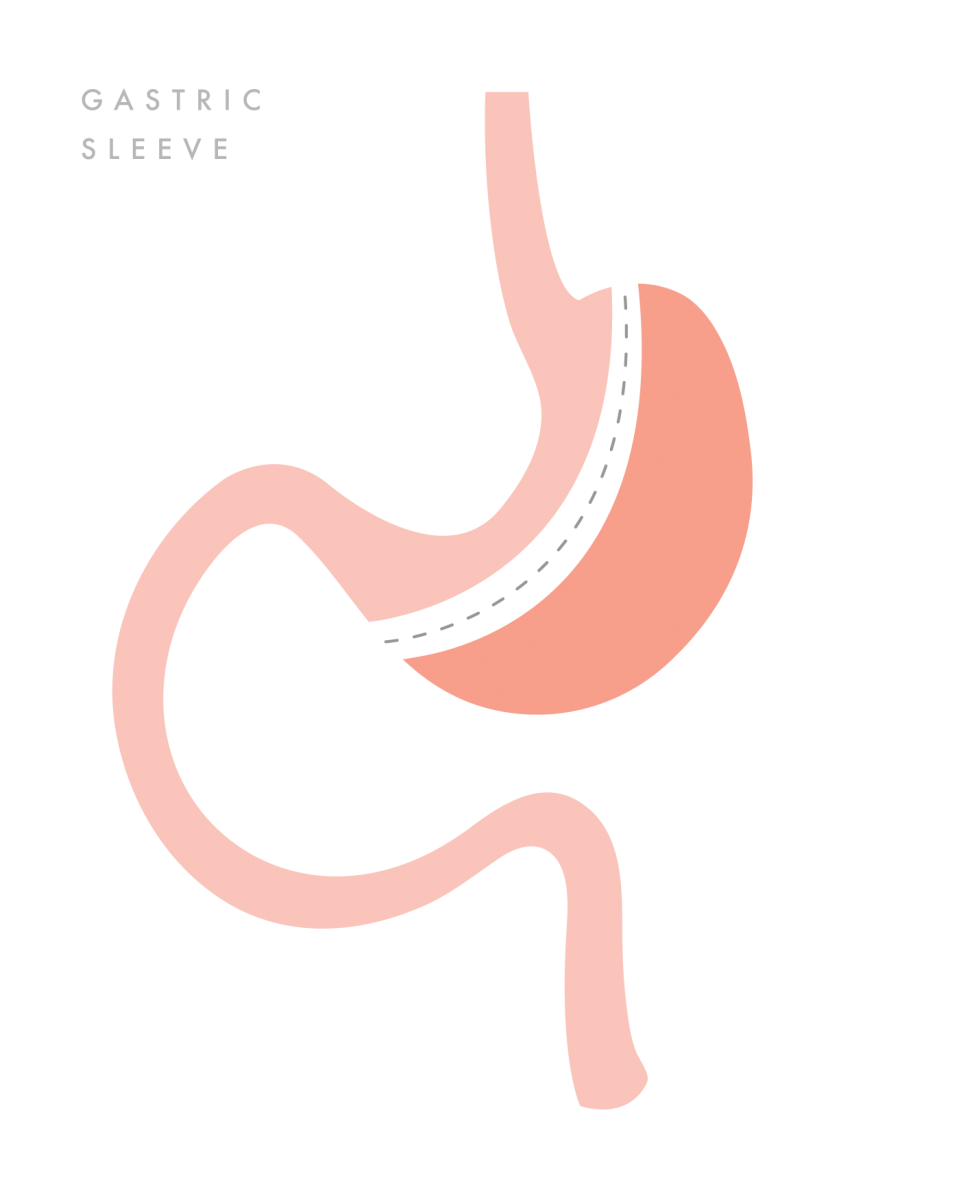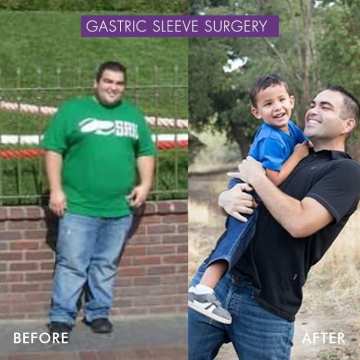

Gastric Sleeve in Tijuana
Gastric Sleeve Surgery in Mexico
At VIDA Bariatrics in Mexico, skilled and caring bariatric surgeons offer gastric sleeve bariatric surgery, also known as vertical sleeve gastrectomy. This advanced procedure might be an appropriate weight-loss tool for patients who are not suitable candidates for other types of weight-loss surgery — such as gastric bypass surgery — due to certain risk factors, including an extremely high body mass index (BMI) and some medical conditions such as anemia.
What is Gastric Sleeve Surgery?
Also known as vertical sleeve gastrectomy, is a restrictive bariatric procedure that reduces the capacity of the stomach by removing 70 to 80% of it. Leaving the vertical tube results in a decreased capacity to eat the same volume of food as before the gastric sleeve surgery with the goal of helping the patient lose weight.


Gastric sleeve surgery has gained popularity in the last years become the most popular among bariatric procedures worldwide due to its simplicity, safety, effectiveness in inducing patients to lose weight, and metabolic changes comparable to gastric bypass, which helps reverse chronic diseases.
Here’s what patients can expect when they undergo gastric sleeve surgery:
- 70-80% of the stomach removed
- 60% to 80% excess weight loss
- The restrictive gastric sleeve procedure can induce metabolic changes
The knowledgeable bariatric surgeons at VIDA Bariatrics prefer to use the laparoscopic approach to sleeve gastrectomy, when medically appropriate for the weight loss surgery patient. This is because the laparoscopic approach is less invasive than the traditional “open” gastric sleeve surgery approach: laparoscopic surgery involves the use of a few smaller incisions as opposed to the large incision used in open surgery.


Gabriela Rodriguez Ruiz MD PhD FACS
What to Expect After Gastric Sleeve Surgery in Tijuana, Mexico
Gastric sleeve sur patients should expect to take about one week off from their jobs or usual schedule. With gastric sleeve surgery, patients can start consuming liquids immediately. However, weight loss surgery patients will still need to eat a liquid-only diet immediately after the gastric sleeve procedure and slowly resume eating normal foods as they progress through their gastric sleeve recovery process. As with all types of bariatric surgery procedures, patients who undergo gastric sleeve must be prepared to make a lifelong commitment to staying healthy following gastric sleeve surgery.
Advantages of the Gastric Sleeve Procedure over Other Bariatric Surgery
Gastric sleeve surgery offers several advantages over other types of bariatric surgery for weight loss. The advantages over other bariatric procedures are that:
- The nerves leading to the stomach as well as the stomach openings are kept intact during the gastric sleeve procedure (as opposed to other forms of bariatric surgery in which the stomach opening and nerves may be modified).
- Again, removing the majority of the stomach also provides a dramatic reduction in the production of hormones that activate the sensation of hunger.
- There is less risk of stomach ulcers than there is with gastric bypass surgery.
- There is no risk of complications related to the Lap-Band because a silicone band is not used with gastric sleeve surgery.
- There is a reduced risk of bypass-related bariatric surgery complications, including nutrient and vitamin deficiencies, internal hernias, anemia, osteoporosis, and others, because sleeve gastrectomy does not involve bypassing the intestinal tract.
Sleeve gastrectomy works on two levels to help patients with weight loss. First, the bariatric surgeon removes a majority of the stomach, resulting in a much smaller stomach pouch. This restricts the amount of food an individual can eat, helping the person lose weight over time.
Second, the smaller stomach produces less Ghrelin after gastric sleeve surgery. Ghrelin is a hormone that stimulates the hunger sensation. Thanks to the smaller amount of Ghrelin, patients who undergo gastric sleeve do not feel as hungry between meals, which can also help with weight loss.
Unlike gastric banding surgery (using the Lap-Band), sleeve gastrectomy is irreversible, so suitable gastric sleeve candidates must be dedicated to weight loss and maintaining a healthy body weight for the rest of their lives.
Gastric Sleeve Surgery in Tijuana Before and After Weight Loss Photos
What Results Can Gastric Sleeve Patients Expect?
If the gastric sleeve patient follows post-op guidelines, sleeve gastrectomy surgery will provide long-term weight loss. However, depending on how committed the gastric sleeve patient is to altering lifestyle and eating habits post-op, weight loss varies. Alongside significant weight loss, gastric sleeve surgery can have the following benefits:
- The nerves leading to the stomach and the stomach openings are kept intact in a gastric sleeve (as opposed to other forms of bariatric surgery in which the stomach opening and nerves may be modified).
- Removing the majority of the stomach dramatically reduces the production of hormones that activate hunger hormones, helping to promote weight loss.
- There is less risk of stomach ulcers than with gastric bypass bariatric surgery.
- Reduced risk of bypass-related complications, including nutrient and vitamin deficiencies, internal hernias, anemia, osteoporosis, and others, because sleeve gastrectomy does not involve bypassing the intestinal tract.
- Weight loss may improve or resolve conditions related to obesity such as heart disease, high cholesterol, obstructive sleep apnea, or type 2 diabetes.
Gastric Sleeve vs Gastric Bypass Weight Loss Surgery
Gastric bypass and gastric sleeve gastrectomy are two of our most performed types of weight loss surgery at VIDA Wellness and Beauty. While both gastric sleeve surgery and gastric bypass reduce the stomach size, only gastric sleeve surgery permanently removes part of the stomach. With gastric bypass, a small pouch is created, and the remainder of the stomach is completely bypassed – but the organ still remains within the body.
While both gastric sleeve and gastric bypass surgery are responsible for patient weight loss and improved health – not everyone is a candidate for both bariatric procedures. If you are not sure which weight loss surgery is right for you, that is no problem. During your consultation, our bariatric surgeon will help determine the best weight loss surgery for your weight loss journey.
Are There Any Complications with Gastric Sleeve?
While they are not very common, gastric sleeve surgery procedures for weight loss can carry short- or long-term risks.
Short-term bariatric surgery risks include:
- Excessive bleeding
- Infection
- Adverse reactions to anesthesia
- Lung or breathing problems
- Blood clots
- Leaks from the stomach incision
Long-term gastric sleeve risks include:
- Low blood sugar (hypoglycemia)
- Hernia
- Vomiting
- Gastroesophageal reflux
- Malnutrition
In very rare cases, patients may have to undergo gastric sleeve revision surgery to repair a leak.
Life After Gastric Sleeve Surgery
Patients who have undergone laparoscopic gastric sleeve surgery should be prepared to rest and recover for two-three weeks post-op. Weight loss surgery patients will need to prepare for a special liquid-only diet immediately after the procedure and slowly resume eating regular foods as recovery progresses. Physical fitness and activity levels should also gradually increase until a more permanent exercise routine becomes normal.
While the body is recovering and an appropriate nutrition plan is followed – the bariatric surgery patient must prepare to make a lifelong commitment to healthful living and weight loss. These permanent changes are mandatory to keep the weight off, and many patients find significant weight loss success when participating in nutrition follow-ups and behavior monitoring.
How Much Does Gastric Sleeve Surgery Cost in Mexico?
You can expect to pay around $5,000 US Dollars for gastric sleeve surgery in Tijuana, Mexico. At VIDA Wellness and Beauty, we offer the highest-quality gastric sleeve surgery in Mexico for a significantly lower price than in the United States (normally starting around $4,790*). Our lower price does not come with lower safety standards. We have a state-of-the-art facility and highly skilled bariatric surgeons with the country’s most prestigious certifications and credentials. Our weight loss surgery team members are experts in minimally invasive techniques for gastric sleeve surgery, and we can offer this skill to all our patients at a low cost. Our gastric sleeve surgery price includes:
- Transportation to and from the hospital
- EKG and diagnosis
- Pre and post-op lab work and evaluations
- Costs to perform gastric sleeve surgery (including surgeon & anesthesiologist fees)
- Any necessary post-op antibiotics, antacids, or pain medications
- Hospital stay (1 night)
- Recovery boutique stay (1 night)
- Follow-up gastric sleeve post-op care
- Transportation to and from the hotel/airport
*Restrictions may apply.
To schedule an appointment with our bariatric surgeon to learn more about whether you should undergo gastric sleeve surgery for weight loss and the advantages of gastric sleeve surgery in Tijuana, Mexico, contact VIDA Wellness and Beauty by calling 1-619-313-6435 (toll free). Start your weight loss journey today with a weight loss surgery consultation!
More Info About Bariatric Surgery & Weight Loss
Gastric Bypass Surgery in Mexico
What Are the Long-Term Success Rates of Bariatric Surgery?
Weight Loss Surgery vs Diet and Exercise
Gastric Bypass vs. Mini Bypass: Which One Is Better?
The First 30 Days After Bariatric Surgery







